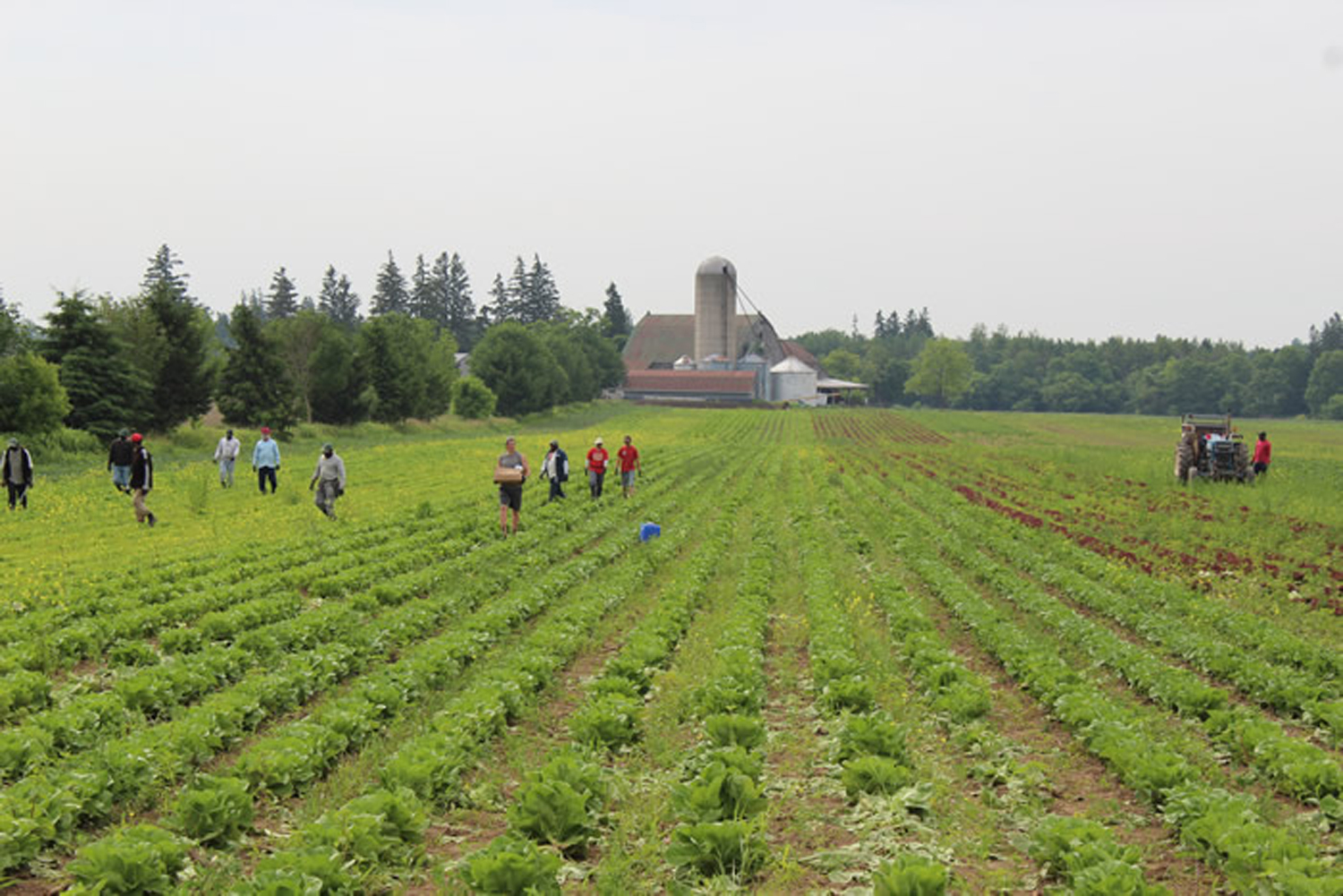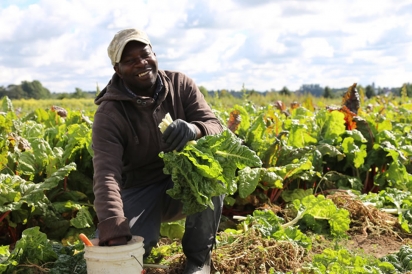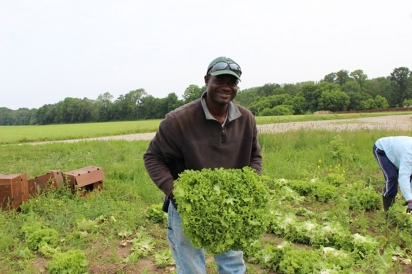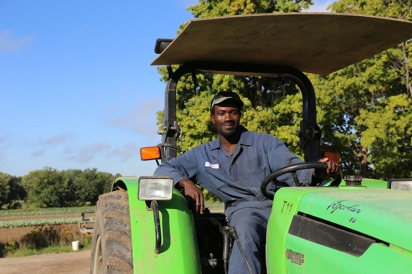Canada’s Seasonal Agricultural Worker Program Employs Migrant Workers
Fields of Dreams
As the tractor moves down the field, slowly and carefully to precisely match the rows of tiny plants, the lyrics of a ballad float above the engine’s dull rumble. Treavor, known to people from the area as The Singing Tractor Driver, has a great voice and isn’t shy about sharing his talent with those around him. Every year he says goodbye to his wife and children in Jamaica to come and work on our farm. Throughout the season he, like many workers, keeps in touch with his family by phone, Skype, or text message.
His story is not unique. Would you like to hear about Neville, whose children have earned top marks in school? Thanks to his sacrifice of travelling for work, they can attend school. He dreams of retiring modestly with a trucking side-business for supplemental income. Or Desmond, whose wife keeps their daughters on the straight and narrow while he is so far away. His eyes light up when he talks about his love for her and the beautiful, intelligent girls they are raising. On our farm we have twenty-five men coming every year under Canada’s Seasonal Agricultural Worker Program (SAWP). Each of them has a story as individual as a fingerprint yet each story has one common, driving goal: employment for a better life.
Across the province and country, and around the globe, workers travel from their homes to where the jobs are. This is nothing new for humanity. People have been leaving home and family to find better opportunities since our species first set out from the cradle of our birth in Africa. When we developed governments and systems and infrastructure, we started regulating who could go where, and when. Today there are regulatory pressures on the movement of workers that disenfranchise them and fuel disparity.
At first blush, the Temporary Foreign Worker Program (TFWP) seems like the perfect marriage of supply and demand – our need in Canada for people who want to work and have the skills, with the people elsewhere who need the employment opportunities. The SAWP is one stream of the TFWP. What happens, however, when an employer is not treating the worker well? The worker is thousands of miles away from their family and support network and often doesn’t know who to turn to.
What makes a person willing to bear loneliness and isolation and even risk poor treatment in a country where they may not even speak the language?
Hope. They hope that they can earn enough to change their lives and those of their children. Desperation. When the work they can find in their home country pays so little it is nearly impossible to afford education or do more than feed and clothe themselves, people look for an alternative.
Have you ever wondered whether you would lose your job if you disagreed with your boss? Did you speak up anyway? Would you speak up if you knew that you could not only lose your job but be sent back to a country where your chances of finding another job were dismally slim?
On paper, labour standards and human rights apply to TFWP workers just as they do to resident workers. In Canada, when labour standards are not met or human rights are not being respected, there is a system of recourse for all workers. If a permanent resident is unhappy with their employment, they can look for another job and leave. In the case of all SAWP workers and for many employed under other streams of the TFWP, however, the work permit is “closed,” meaning they are not allowed to work for anyone other than the business listed on the permit. The employers holds the trump card; the workers lose temporary residency status if they leave their employer. When the workers’ residence is dependent on the employer, their voices are easily silenced. They can become disenfranchised.
This disenfranchisement has led to workers enduring racial slurs, assault, unsafe working conditions, and many other insults that dehumanise and debase them. On one particular farm in Ontario, workers are routinely left in an isolated field for a full workday with no food, water, or toilet facilities and no transportation to access these basic amenities. In other places women in the TFWP program often have to put up with unwanted attention from their employers rather than lose their jobs. Some workers have been struck by their employer for “talking back.”
Many workers are frequently short-paid but since the employer has the records and control over them, they cannot prove it. Standards for worker housing exist and each year these bunkhouses must be inspected. Many jurisdictions have taken the enforcement of these standards seriously. But given the experiences of many SAWP workers, it would seem that critical deficiencies are being missed. Workers have been allowed to return year after year to housing that has leaking roofs, inadequate toilet and laundry facilities, and electrical problems.
Some workers stand up and speak out. Most silently endure this treatment that makes a lie of the cherished notion that Canada is a polite nation. Many return to their homes disillusioned and defeated. In the case of SAWP workers, they risk their contracts not being renewed for the following season if their employer feels challenged or criticized. After all, there are plenty more workers waiting for a chance to travel to this land of opportunity.
The list of abuses could take up a lot of space. There are documentaries that tell the stories around them such as Min Sook Lee’s recently released documentary “Migrant Dreams” and her previous work, “El Contrato.” There are many articles and even a few court cases that have documented the problems faced by workers. The Twitter feed of organizations like Justicia For Migrant Workers (@J4MW) brings us a stream of comments on these stories.
With all its flaws and serious challenges, the SAWP doesn’t just bring employees to our farm; it brings us people who are friends that enrich our lives. This article could easily have been a story of friendship, culturally diverse community, and joyful sharing. That article needs to be written, too, but today there’s another story that needs telling.
When you ask a migrant worker what they would like to change about the program, they are often reluctant to answer. When they realize the question is coming from genuine interest and concern, the responses are simple. They ask for the Canadian Employment Insurance (EI) benefits they pay into but are denied access to. “Why do we have to pay into the EI program when we can’t collect benefits?” The SAWP workers did receive EI parental benefits for a short while, but this was revoked under claims of fraud. There must be a reasonable method for reducing fraud without denying workers a rightful access to benefits they have paid into.
Family visits are perhaps the most frequently expressed wish. Being so far away from their loved ones is not easy. Many families would love to be able to come and visit if only for a short few weeks. Visitor visas have been difficult for farm workers’ families to get. The application process is open to them, but the applications are often denied.
Recently a very thoughtful suggestion came up at our Film on the Farm screening of “El Contrato”: institute an exit interview for SAWP workers. This way they would know if they will be returning the next season. In the case where an employer will not recalling the worker for the next season, they would have an opportunity to explain why. This would enable the workers to learn from any mistakes and plan appropriately when they return home. Many workers travel home at the end of the season with no inkling of whether they will be able to return the following year. They may think all went well during their contracted time in Canada and yet not be recalled. There are many half-built houses in Jamaica, bearing mute testament to workers having lost their contracts in whatever country they were working in.
On any farm in Canada, there are workers whose responsibilities are more than entry-level labour. While the majority of the work done is compensated at minimum wage, those permanent-resident workers whose abilities and skills enable them to take a leadership role are often compensated accordingly. While the SAWP stipulates one must comply with the Employment Standards Act, there is a gap in the regulatory framework. Under the SAWP, the workers’ contract stipulates minimum wage unless that minimum has not changed in a significant time. There is no provision for appropriately increasing compensation to workers as they gain skills and experience. Employers can step up to negotiate an increased wage, albeit in a burdensome regulatory process, but with current supply and demand the system is weighted towards the employer not offering compensation equal to what is paid to skilled permanent-resident workers.
As this article is being written, the Harvesting Freedom Campaign has just launched its Caravan to march from Windsor all the way to Ottawa, ending on October 3. They are calling for open work permits and for workers to have permanent residency status on arrival.
This would be an effective way to reduce the abuse that workers face. It would empower them to exercise their rights. Employers spend considerable effort and money to bring workers from other countries. If the workers are given status and open work permits, the employer might fear they will not stay. Some will indeed leave. Our job as employers is to create a place where workers want to stay. Make our human resource policies reasonable, fair, and supportive for our workers. Create a place where people want to work, and they will. If the only reason your employee is staying in your employ is because they are trapped, you are failing in your duty as an employer. Relying on a legality to bind them to our employ is no better than reducing them to indentured servitude. We have to do better than that.
Last spring, the Standing Committee on Human Resources, Skills and Social Development and the Status of Persons with Disabilities (HUMA) of our federal government reviewed the Temporary Foreign Worker Program. No doubt the members of HUMA put a lot of effort and thought into the recommendations they will put forward. This fall the report of that review will be tabled in the House of Commons. This is the time to advocate for policies and regulations that are fair, reasonable, and useful. Our job as concerned citizens is to engage with the process of change they are undertaking and to strengthen their understanding, support positive changes, and challenge the status quo.









